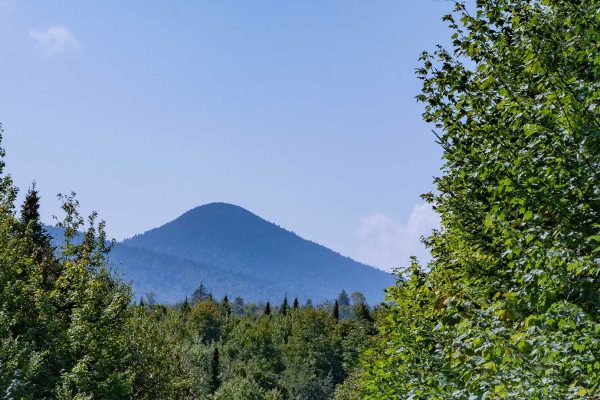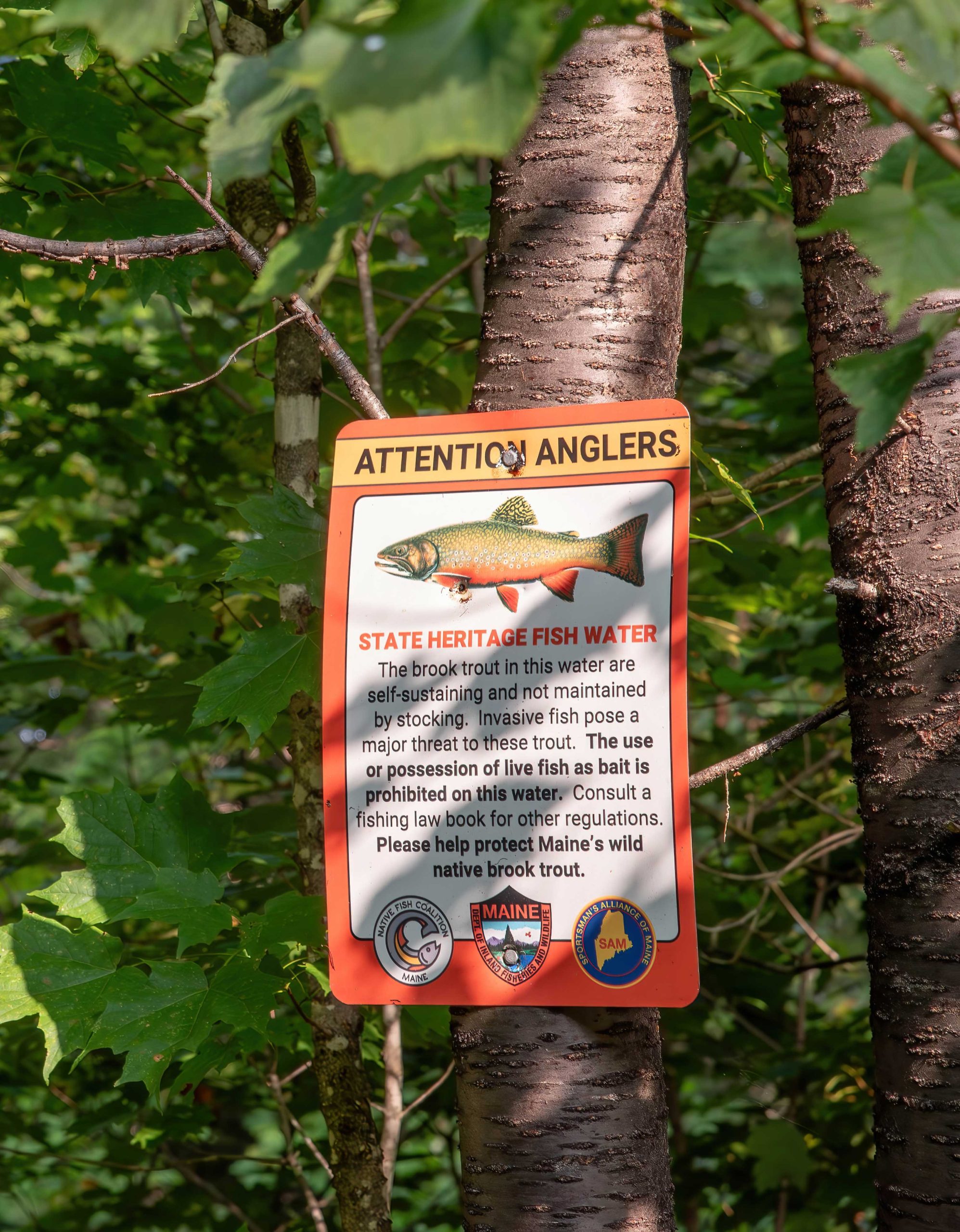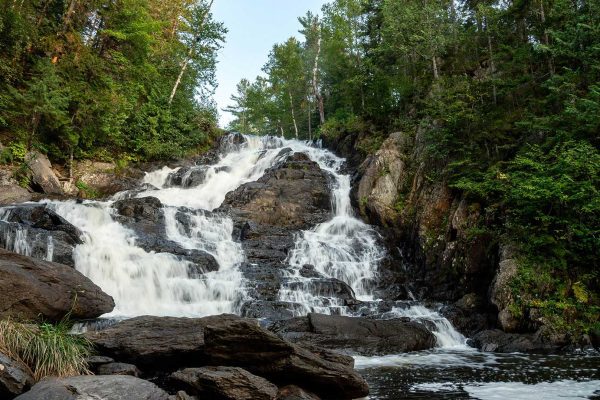
Pickett Mountain as seen from Grass Pond. Photo by N Duggan
An untested and underfunded company called Wolfden Resources has submitted a second rezoning petition to the Land Use Planning Commission (LUPC) to allow for the development of a zinc mine near Pickett Mountain in the Katahdin region. The Canada-based exploration and development company focused on metallic mining deposits was forced to withdraw its first application in 2021 because it was riddled with errors.
The proposed mine has been identified by the LUPC as an “issue of statewide concern” and has attracted a lot of attention because of its location just miles away from Baxter State Park and Katahdin Woods & Waters National Monument.
Here are some answers to frequently asked questions that have arisen as people seek to better understand what is being proposed.

State Heritage Fish Waters sign above Grass Pond. Photo by N Duggan
What is the potential impact on local wildlife and fisheries?
The location of the proposed mine is directly adjacent to some of the state’s best habitat for brook trout and Atlantic salmon. It is next to three State Heritage Fish Waters and contains the headwaters of the West Branch of the Mattawamkeag River, which is federally designated critical habitat for endangered Atlantic salmon. The Penobscot Nation and organizations have worked hard to restore habitat for Atlantic salmon and brook trout in Maine. Mining pollution could reverse this progress.
The mine would destroy critical habitat for threatened Canada lynx and habitat for other iconic Maine species, such as moose and pine marten.
Why should LUPC reject Wolfden’s petition now instead of letting the permitting process play out if Maine has the strictest mining laws in the country?
Bad proposals shouldn’t just get a rubber stamp as part of this process. The LUPC plays an important role in protecting the character of the North Woods, and their review is an integral first step in determining if and where industrial development is appropriate in the Unorganized Territories. If Wolfden can’t meet LUPC standards, then its proposal should be rejected so that we don’t waste any more taxpayer money.
As part of the LUPC review, Wolfden must demonstrate that it has the technical expertise to build a mine and that its project is well planned. The company has repeatedly failed to meet both of those criteria.
Wolfden has never built or operated a mine. It’s a small company that has lost millions of dollars since purchasing land in Maine in 2017. Its proposal is poorly planned and thought out. For example, Wolfden has not even stated where it will build its ore processing facility, a major component of a mining operation.
Wolfden’s proposal for wastewater treatment also doesn’t hold up to scrutiny. The company proposes to use reverse osmosis filtration in order to treat wastewater and discharge it at levels that are as clean as natural groundwater or surface water in the area. However, no matter how many times in the last five years NRCM or State agencies have asked Wolfden to provide an example of a comparable mine that can do this, it has not.
Doesn’t the U.S. have a responsibility to develop mines here where there are better working conditions and environmental protections instead of elsewhere in the world?
The U.S. already has a robust zinc mining industry, and there isn’t a shortage of the metal here. In fact, the U.S. is the world’s third largest exporter of zinc, after Australia and Peru.
The deposit that Wolfden proposes to mine is small and would hardly make a dent in the world supply. It is simply not worth the risk of destroying this undeveloped, ecologically significant area that is the centerpiece of a booming outdoor recreation economy for such small gains, especially when much of the profit would flow out of state.

Shin Brook Falls at dusk. Photo by N Duggan
What is the significance of the area surrounding the proposed mine site to Wabanaki tribes?
The Katahdin region and Penobscot River watershed are sacred to Wabanaki tribes. The tribes have an intimate cultural and physical relationship with the land and water, which continues today through traditional practices such as sustenance fishing and hunting. The location of Wolfden’s proposed mine is near several important tribal trust lands.
The tribes also have a close connection to Atlantic salmon and have long worked to recover habitat for the species. The proposed mine would be located in critical habitat for endangered at Atlantic salmon and would endanger that progress.
Would the local economy benefit from a mine?
There is no evidence Wolfden’s proposal would provide long-term economic benefits.
Mines have a long history of empty promises when it comes to jobs and local investment. Most jobs for Wolfden’s mine would be filled by people brought in from out of the region who have mining knowledge and training. And Wolfden hasn’t started a training program for locals as the company said it would several years ago.
The life span of the mine is estimated to be just 10 years so any opportunities would be short-term. After the mine closes down, the region would be stuck with the toxic waste, which must be stored in perpetuity. The mining industry also has a long history of leaving taxpayers to pay for cleanup costs here in Maine and across the country.
The region’s stunning natural resources are the backbone of Maine’s outdoor recreation economy. Supporting and expanding outdoor recreation opportunities are the best options for creating long-term jobs and supporting local businesses in the region.
—Melanie Sturm, NRCM Forests & Wildlife Director










Please tell me in which township is Pickett Mountain and the proposed mine site? Is it in a township or TR area? Nancy Chandler
Hi Nancy. Thank you for your question. Pickett Mountain is located in T6 R6 WELS in Penobscot County. You can see a map of its location here: https://www.peakbagger.com/peak.aspx?pid=12680
This is the craziest business proposal for the most pristine part of Maine! Have you ever seen a mining operation? It’s an ecological disaster! End this madness now!!!
Say NO! Do not allow mining to take place!
Just watch Gold Rush on the television to see what mining is like. They process tons of material and totally destroy the landscape. The Canadian environmental protections seem much more lax. Let the company involved mine in Canada from where it hails.
Are there any organized groups opposed to the mine that we can help support?
NRCM is one of the lead organizations working to oppose the mine. If you haven’t yet signed up to receive emails keeping you updated on our work and the LUPC decision, please visit https://www.nrcm.org/programs/waters/metal-mining-pollution-maine/. Also, you can make a donation in support of our work at https://www.nrcm.org/donate/